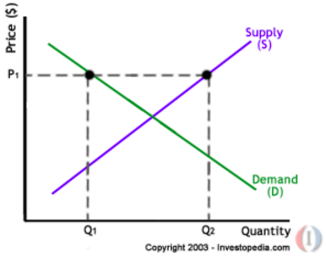This blog is mainly aimed at clinicians wanting to learn how to code or innovate with tech in health. However, last night I found myself sitting on the tube surrounded by long faces as there had been a terror attack roughly an hour earlier. So today I will be writing about a particular part of this attack. It has some grounding in economics so I guess it’s not completely out of theme for this blog. Before we set off home a friend ordered an Uber and was annoyed that there was a price hike. She started talking to the rest of us about how it was terrible that they were making money out of a terror attack. Considering the mood of the situation and that tensions could run high at any moment I decided to let her get it off her chest. However, today I need to stress a few things.
Price hiking in relation to supply and demand is an important function. Sure we can get obsessed over the greed of some who price hike. However, economics isn’t about feelings but the best distribution of limited resources. We can use an example that I have used before to highlight this. Let’s say that there is a complete blackout and people rush to the nearest stores around the city to get flashlights. Now a family may want 4, one for each child and parent so they can all move freely around the house. However, if all the families did this then the store will quickly run out. If there is a price hike then people will think twice about buying 4 flashlights. They will more likely buy 2 and share. As a result, more households will get access to a flashlight. We could try to police the amount brought per person but families can split up and pretend to be individual customers. Policing these things is very ineffective. This is why communist countries become authoritarian. The centralized planning cannot respond to fluctuations in supply and demand all over the country quickly enough. This is why the Soviet Union had storage houses with tons of rotting produce that couldn’t be processed quickly enough whilst people qued up for bread. Heavy policing and rationing become the solution in these communist countries. A store owner can make the snap decision for a price hike instantly. He know’s his demographics, the store and what’s happening on the ground right now. If he had to wait for a reply from central planning flashlights would be sold out before the reply, and fewer households would have access to a flashlight.

Looking at the terror attack in London I’m guessing that the price hike was a result of an algorithm. Whatever the cause lets look at the effects. People will be more likely to be economical with an Uber. People using Uber to get home quickly will be more likely to share a cab with others to split the cost with some walking a bit of the way. This reduces the traffic in the area and increases the number of people transported per number of cabs. People outside the area who are in no rush may choose to wait or pick other methods of transportation again increasing the number of available cabs to where they’re needed most. People do not even have to be aware of the terror attack, yet they will still be inclined due to the price hikes to act in a way that increases the availability of cabs. In economics, this is called the invisible hand. This quick feedback mechanism of supply and demand is why free market countries have their problems but do not have mass starvation and great inefficiencies in production like communist and socialist countries. This dynamic pricing is why Uber provides a good service. On a normal day, if the user has the flexibility to travel any time of the day, they have a financial incentive to use the service during non-peak hours. I think most people at the center who wanted to get home quickly would happily pay more and get home quickly than pay the same price and be delayed, or not get an Uber at all. If these people are not willing to then Uber would have to lower its price widening the net again or lose out on business.
Is it moral? That’s for you to decide. Personally, it tugs at the heart strings when someone who cannot afford what they need. It warms me inside to see people give needed stuff away for free in the sense of charity. The world is a better place for this. And I am human, emotionally I’m not at ease with people having to pay more because they are in a tough situation. However, we cannot ignore that the price hike by the algorithm meant that instantly, Uber drivers and potential customers started instantly acting to increase the availability of cabs even if they were completely unaware that there was an attack without extra coordination. In economics, there’s always tradeoffs with no perfect solutions. Sadly in this modern age of social media people are all too willing to be outraged instantly at a drop of a hat. I’ve already seen people on Twitter calling for a boycott of Uber.


not to mention that its a delicate balance– too high and people wont use it, too low and theres no incentive to be a driver.
a slight price hike is an added incentive for people to drive. whether anything uber ever does is slight, all i know about that is theyre too expensive for me. and yet i dont think a price hike is automatically immoral, in theory its a balance. in practice, the effects (increased price? increased availability?) say more than the numbers.
LikeLike